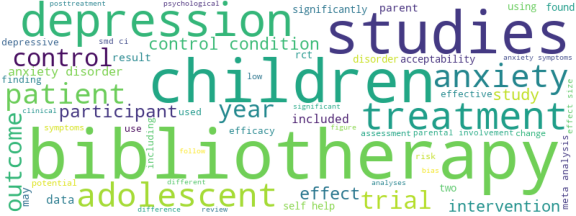| Id | 602 | |
| Author | Yuan S., Zhou X., Zhang Y., Zhang H., Pu J., Yang L., Liu L., Jiang X., Xie P. | |
| Title | Comparative efficacy and acceptability of bibliotherapy for depression and anxiety disorders in children and adolescents: A meta-analysis of randomized clinical trials | |
| Reference | Yuan S., Zhou X., Zhang Y., Zhang H., Pu J., Yang L., Liu L., Jiang X., Xie P.; Comparative efficacy and acceptability of bibliotherapy for depression and anxiety disorders in children and adolescents: A meta-analysis of randomized clinical trials ;Neuropsychiatric Disease and Treatment vol:14 issue: page:353.0 |
|
| Link to article | https://www.scopus.com/inward/record.uri?eid=2-s2.0-85041125589&doi=10.2147%2fNDT.S152747&partnerID=40&md5=8dcfddc5140e23ef7bfa7179483e0c6b |
|
| Abstract | Background: Depression and anxiety are the most common mental disorders in children and adolescents. Bibliotherapy is a treatment using written materials for mental health problems. Its main advantages are ease of use, low cost, low staffing demands, and greater privacy. Yet few meta-analyses have focused on the effect of bibliotherapy on depression and anxiety disorders in children and adolescents. Methods: We included randomized controlled trials comparing bibliotherapy with control conditions for depression and anxiety in children and adolescents (aged #18 years). Five electronic databases (PubMed, Embase, Cochrane, Web of Science, and PsycINFO) were searched from inception to January 2017. Efficacy was defined as mean change scores in depression and anxiety symptoms. Acceptability was defined as the proportion of participants who discontinued the treatment. Random effects model was used. An intention-to-treat analysis was conducted. Results: Eight studies with 979 participants were selected. At posttreatment, bibliotherapy was significantly more effective than the control conditions in reducing the symptoms of depression or anxiety (standardized mean difference, −0.52; 95% confidence interval CI , −0.89 to −0.15). Bibliotherapy did not have statistically significantly more all-cause discontinuations than controls (risk ratios, 1.66; 95% CI, 0.93 to 2.95). We also performed subgroup analyses for efficacy outcomes in different categories (types of disorder, mean age, control conditions, and parental involvement) of studies and found that bibliotherapy has been more effective in depressive adolescents. Limitations: Limited studies were eligible in this review and hence there was potential publication bias. Conclusion: According to the findings in this review, bibliotherapy may be more beneficial in treating depression in adolescents, but shows less robust effects for anxiety in children. Further well-defined clinical studies should be performed to confirm these outcomes. © 2018 Yuan et al. |
|
| Keywords | Bibliotherapy; Mental disorders; Meta-analysis; Psychotherapy; Self help; Young |
Wordcloud:



